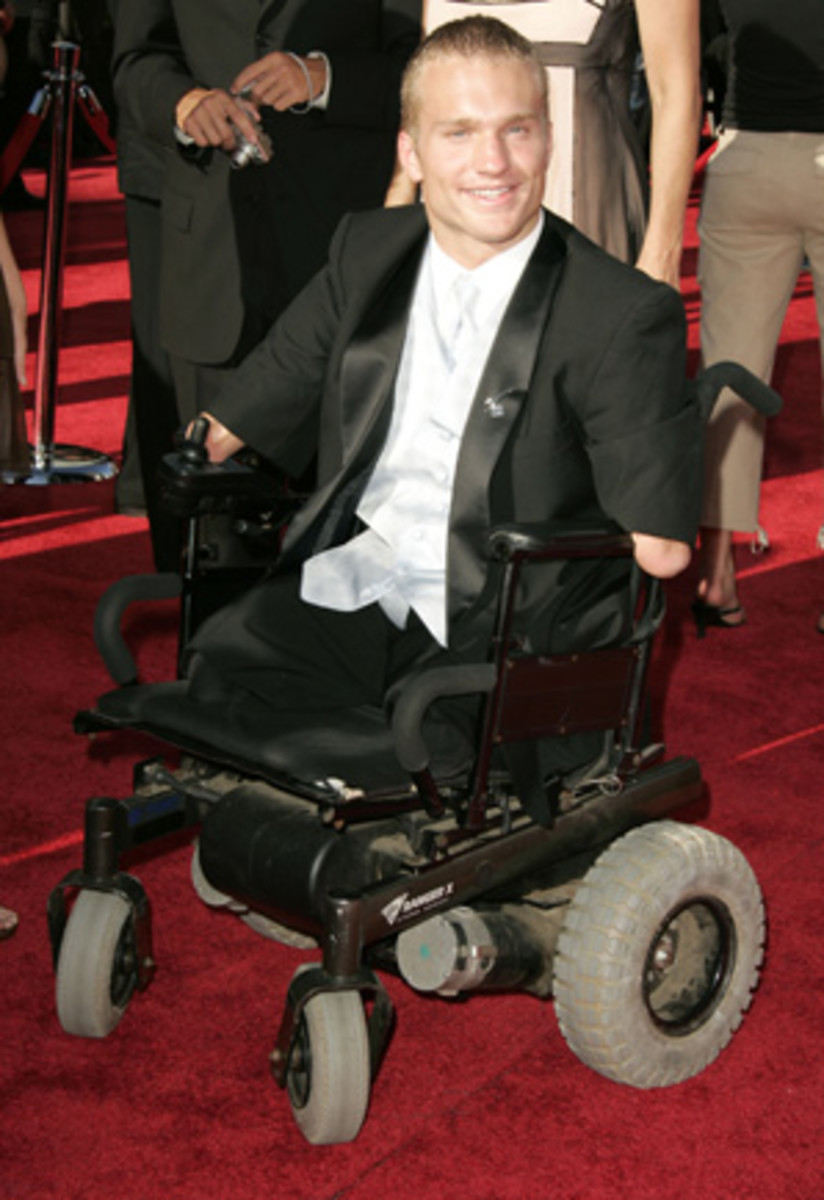A life of defying odds
A young man without arms or legs is itching for a fight. A willing promoter found a willing opponent. And Alabama doesn't seem to mind any which way.
These are the circumstances that place 23-year-old KyleMaynard, a congenital amputee (an estimated one-in-2000 babies are missing some portion of a limb at birth), who is less than two days away from his amateur mixed martial arts debut.
Other bantamweights will enter a cage for the first time Saturday, though it's safe say none outside Maynard have feet attached at their hips, and arms ending at the elbows. At first blush, an amputee fighting in a cage comes off as something HowardStern might promote. David Oblas, a 33-year-old Auburn University alum, isn't Stern. Nor is he DanaWhite, the president of the Ultimate Fighting Championship. Oblas is, however, a seven-year veteran of the MMA promotion business, Maynard's friend and the man Maynard called when it was time to transform yet another seemingly impossible dream into reality.
"I asked the same questions everyone else asked," Oblas said. "How are you going to defend yourself? How are you going to strike your opponent? How in the heck are you going to win the fight?"
It was hardly the first time Maynard needed to answer "how" he might do something. Ingenuity and perseverance have generally been useful guides. Never feeling sorry for himself. Never getting down. Always believing that hard work would lead to a good place. They all played their part as Maynard, with the strong support of his family, learned to pen his name in cursive, type 50 words a minute, open a jar, drive a car, or anything else most people would regard as mundane.
Then there is the brilliance. The reason he appeared on Oprah, wrote a best seller or won an ESPY. Why he realized that simply living a comfortable life wasn't any kind of life at all.
Wrestling is one of those things Maynard would have been commended for just trying. Losing his first 10 matches was tough. His first 20 made him ponder the point. After No. 30, his faith was fractured. But Maynard, then 11, continued to get on the mat, largely at the behest of his father, who never wanted Kyle to forget that failure is fine so long as it doesn't mean giving up. In his 36th match, after a year-and-a-half of driving from tournament to tournament, Maynard finally experienced having his hand raised in victory.
Maynard amassed a 35-16 record, wrestling at 106 pounds in high school. And he drew national attention that led to his receiving a 2004 ESPY award for "best athlete with a disability," even if circumstances suggested the award wasn't a wholly accurate description of his situation.
"I'm not naïve," Maynard said. "I know I've got challenges to overcome that other people don't. But at the same time I think that I almost have an advantage in certain circumstances."
Even in an MMA bout against an able-bodied opponent?
If sparring and training provide an accurate indication, Maynard says he has every reason to feel safe and confident heading into his fight, which will be streamed online for $14.95 and should draw anywhere from 3,000 to 5,000 people to the Auburn Covered Arena.
The state of Georgia disagrees, so Maynard's amateur contest against BrianFry of Madison, Wis., was moved to Alabama. The rules for the bout are slightly modified. Maynard will always be considered a "grounded" opponent, meaning he can't be kicked or kneed to the head. Elbows, too, were removed, but all 10 bouts on the card are subject to that change. Otherwise, this is a real fight.
"If he's able to maintain some top position and let go with one of his limbs, one of his arms, he's going to have some power," said Rory Singer, a former training partner of Maynard and a veteran of the UFC. "You're talking about a kid who holds records with upper body lifts. I've felt that strength in his chest and could only imagine if that was coming down like a sledgehammer. That's going to do damage."
One of the few states in the union without an athletic commission, Alabama served as a safe haven for the UFC in the mid-90s, when the promotion and sport came under fire from disapproving politicians. In August 2007, the Georgia Athletic and Entertainment Commission informed Maynard in that it would not license him to fight in his home state. So he and Oblas, continuing forward with their plans, headed to Alabama.
"The [Georgia] athletic commission has a lot to lose and not very much to gain," said Maynard, when asked if he understood why he was denied an opportunity to compete. "It's similar to the way a lot of people view my opponent. That's why I have huge respect for [Brian], and why I think the athletic commission took the easy route out."
If successful in his debut against Fry -- the sixth or seventh fighter (Oblas wasn't sure) offered a chance against Maynard -- the pair plan on returning to Georgia and applying again. Asked if a successful and safe debut would improve Maynard's chances of gaining licensure, the GAEC declined to comment.
But it's not only regulators who expressed doubts over Maynard's decision to fight. Former training partners, including Singer, are concerned for Maynard's safety, though there isn't any doubt about the amputee's competitiveness.
"I hate to lose," said Maynard, a competitive powerlifter, who, just five weeks ago, butterfly pressed 420 pounds. "But I realized it's a lot more powerful to focus on the positive and love what you do and want to win."






